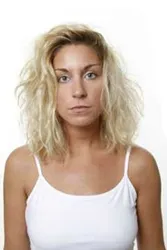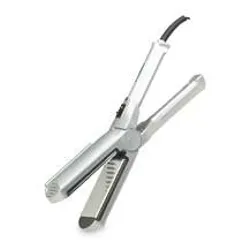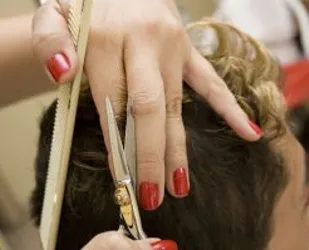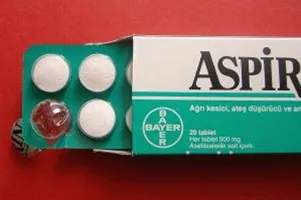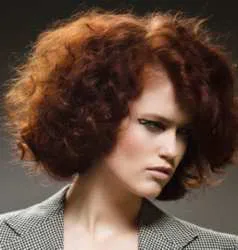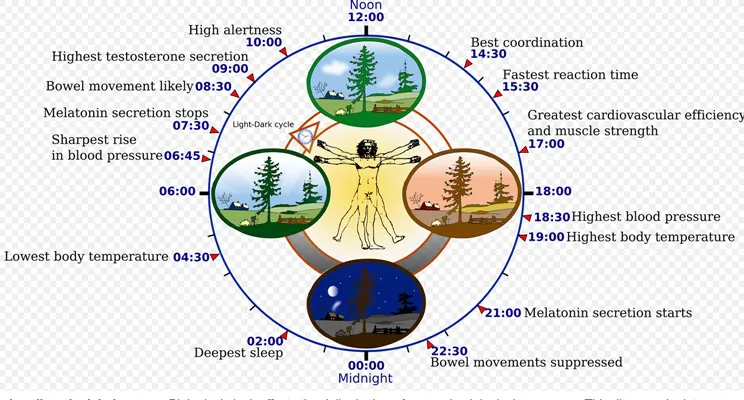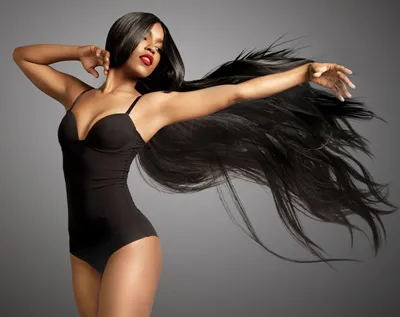
A Wet Wash Trick To Help Revive Dry, Frizzy, Damaged Hair
Many Reasons Exist For Dry, Damaged Hair
 Many Reasons Exist For Dry, Damaged Hair - Image Of Girl In Water - Photo By Chris Hardy On Unsplash.com
Many Reasons Exist For Dry, Damaged Hair - Image Of Girl In Water - Photo By Chris Hardy On Unsplash.comHair can be dry, damaged, ripped, split, frizzy and puffy.
How does that happen? In some cases, like mine, you can be born with hair which is naturally coarse and dry.
Yes, genetics can set you up for dry crunchy hair.
Other causes of dry and damaged hair include chemical treatments (bleach, hair color, relaxers, straighteners, perms or similar).
An unhealthy lifestyle, improper hair maintenance habits and heat damage may also be contributing factors.
Water Can Be A Major Hair Damage Culprit
Water all by itself can damage hair.
Did I say water? Yes. Hair dryness and damage may occur from over-washing. Water, all by itself, can actually damage hair.
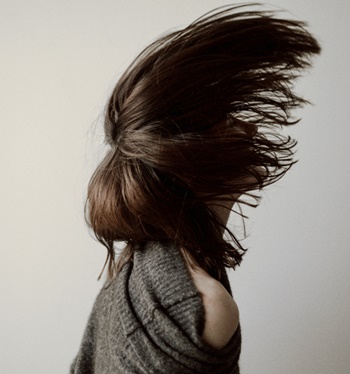 Many Reasons Exist For Dry, Damaged Hair - Photo By Katsiaryna Endruszkiewicz - Unsplash
Many Reasons Exist For Dry, Damaged Hair - Photo By Katsiaryna Endruszkiewicz - UnsplashThe longer hair is wet, the more the hair actually swells. As it becomes more swollen, wet hair is especially prone to damage and breakage.
Hair Cuticle Swelling Occurs When Exposed To Water
The simple act of wet washing strands ultimately has an effect on its overall health, ultimate appearance and manageability.
Every time hair gets wet, damage occurs to the shingle-like cuticles which cover the outside of the follicles.
When hair is dry, the cuticle's edges are flat.
However, when hair gets wet it swells, by as much as 30-35%. As the cuticles swell, if the hair is already compromised by chemical or other damage.
Protein Escapes From Swollen Follicles
Protein can escape from the swollen follicles, creating holes, rips and tears, resulting in breakage. This may not be the case for healthy strands, but it's definitely true for damaged tresses.
 Many Reasons Exist For Dry, Damaged Hair -Girl In Waterdrops - Photo By Katsiaryna Endruszkiewicz - Unsplash
Many Reasons Exist For Dry, Damaged Hair -Girl In Waterdrops - Photo By Katsiaryna Endruszkiewicz - UnsplashBesides breakage, water damaged hair manifests itself in frizz, split ends, fly-a-way strands, fluffiness and faded color.
Preventative Pre-Wet Wash Treatments
Although you may try to prevent water damage with pre-wash scalp masks, deep conditioning or related treatments, there's a secret wet wash trick
which can help revive dry, damaged strands.
Hot oil treatments may or may not help prevent water damage. They also may not help revive dry, damaged strands.
Only two oils (coconut and olive oil) used on tresses have been proven to be able to penetrate beneath the cuticles into the hair's core.
A Secret Wet Wash Product To Revive Dry, Damaged Strands
Hair serum, when applied to bone dry hair before wet washing can help to heal damaged strands while protecting it during the cleansing process.
This secret may come as a surprise to some hair professionals and consumers since serum is not normally considered a traditional pre-shampoo product.
Hair serum is primarily considered to be a finishing product and not a pre-wash treatment, even though it works very well as one.
Serum is a great product for protecting hair from water damage because it usually contains some form of silicones.
Silicone Or Related Cones May Not Work For All People Or Their Hair
The reason why silicones are effective at preventing damage is because they act like a chain-like material to help realign hair fibers/
They also give hair a smooth finish, allow hair to move freely and also allows the hair to move more freely.
Ingredients which have names featuring cones in them, such as dimethiconol, smooths and realigns hair fibers as well as gives hair a soft silky feel.
Note: Not all hair responds well to hair either as pre-wet wash or a leave-in sealant. If you know your hair doesn't do well with cones, skip the serum option and use a super hydrating conditioner instead.
Just A Few Drops Work Wonders
When it comes to utilizing this off-brand hair trick, apply just 1-2 drops of serum into the palms of your clean hands and massage together. Rake strands with serum infused hands and fingers.
 Many Reasons Exist For Dry, Damaged Hair - Photo by Omid Armin on Unsplash
Many Reasons Exist For Dry, Damaged Hair - Photo by Omid Armin on UnsplashMake sure to distribute serum from a few inches below the roots down to the ends on pre-detangled tresses.
Start slowly with just a few drops.
If you have long, thick or heavily textured hair (wavy, curly, coily, kinky) you can add a few more drops to make sure you properly cover all your strands.
Wet Wash Hair In Lukewarm Water
Get into the shower and soak hair completely with lukewarm water. Although some of the serum will wash away during the hair cleansing, a lot of it will remain on the hair.
The serum which remains on the hair will fill in rips, cracks and tears in the hair surface. This adds a level of protection to hair while you're wet washing. The serum which remains intact plugs the gaps and holes, leaving a smooth polished surface.
Unlike the option of applying a super hydrating conditioner before cleansing, an initial rinse isn't required when using a serum instead.
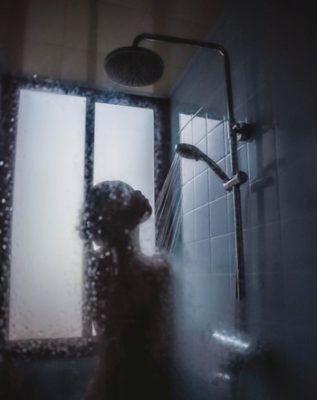 A Wet Wash Trick To Help Revive Dry, Frizzy, Damaged Hair - Woman in Shower - Image by Hannah Xu - Unsplash.com
A Wet Wash Trick To Help Revive Dry, Frizzy, Damaged Hair - Woman in Shower - Image by Hannah Xu - Unsplash.comAs a result hair spends less time in water. This reduces the potential swelling and possible cuticle damage.
Whether you want to follow your cleanse with a conditioner, a hair mask or just a water rinse is up to you and what you feel your hair needs to minimize damage.
Applying serum before shampooing is especially useful if you've bypassed the product after washing due to worry about making hair greasy.
If You Want A Cone Free Serum?
Unfortunately silicones in some serums may damage tresses making them dry, weak, and brittle. While silicone smooths your hair and makes it shiny, it can also weigh your hair down and make it greasy.
Over time, the buildup of serum can lead to scalp irritation, itching, dryness, and flaking.
Whenever possible it's better to use silicone-free serums that do not damage the hair.
SheaMoisture 100% Virgin Coconut Oil Hydration Finishing Oil Serum which is completely Silicone-Free is a popular alternative.
So is L'Oreal Paris EverSleek Sulfate-Free Smoothing System Super Sleek Intense Serum.
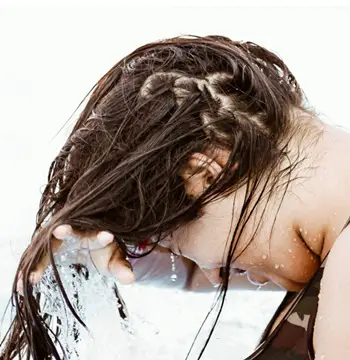 A Wet Wash Trick To Help Revive Dry, Frizzy, Damaged Hair - Erick Larrequi - Unsplash - All Rights Reserved
A Wet Wash Trick To Help Revive Dry, Frizzy, Damaged Hair - Erick Larrequi - Unsplash - All Rights ReservedSome people skip the serum and just use a tiny amount of coconut oil instead. Not all hair works well with coconut oil either, Select the option which works best for you and your hair.
Cleanse With A Sulfate Free Formula
Use a cleanser with a mild surfactant system or use a no-poo, lo-poo or diluted formula to add additional protection from damage.
Less chemical formulas will most likely cause less fiber swelling.
Contrary to popular belief, gentle cleansers will take the grease off the surface.
This isn’t so important when your hair is untreated, but if it is keratin straightened or colored, you've actually damaged the internal structure of the hair fiber.
Kinder shampoos can protect and prolong both color and treatments.
Remove Excess Moisture With Microfiber Towels
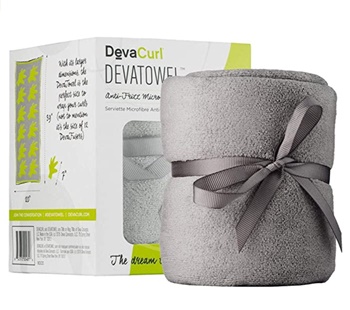 A Wet Wash Trick To Help Revive Dry, Frizzy, Damaged Hair - DevaCurl - Amazon.com - All Rights Reserved
A Wet Wash Trick To Help Revive Dry, Frizzy, Damaged Hair - DevaCurl - Amazon.com - All Rights ReservedIt's also super important to towel dry as gently as possible. As you towel dry, especially if you rub and ruffle, you may actually be chipping off pieces of the cuticle.
When hair is chemically treated, bleached or colored, this is multiplied tenfold and it’s much more likely to cause damage.
You’re not going to avoid washing your hair, as it’ll become dirty, but it’s all about going through the process in a gentle, caring way.
Using a hair-specific micro-fiber style towel will absorb water and keep frizz on lock down. If your hair is wavy, curly, coily or kinky try not to touch it when drying.
The moment you start touching your hair is when it starts to go frizzy. Simply tip your head upside down and let your hair fall into your diffuser of choice.
A simple suggestion? Put one hand in your pocket and let the diffuser do everything.
Other Tricks To Minimize Water Damage
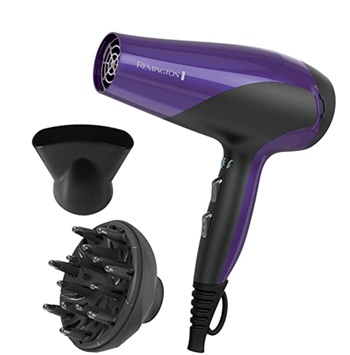 A Wet Wash Trick To Help Revive Dry, Frizzy, Damaged Hair - Remington Blow Dryer + Diffuser - Amazon.com - All Rights Reserved
A Wet Wash Trick To Help Revive Dry, Frizzy, Damaged Hair - Remington Blow Dryer + Diffuser - Amazon.com - All Rights ReservedAvoid washing your hair every day unless it's absolutely necessary due to an oily scalp of lifestyle challenges.
Although washing your hair cleans your scalp, it can also over dry your hair and lead to damaged cuticles and frizz.
Depending on how oily your hair gets, aim to wash your hair only 2-3 times per week.
Other Tricks To Minimize Water Damage
If your hair is dry to very dry or chemically damaged, you may wish to extend the time between wet washing as long as possible
Always use lukewarm water, sulfate free cleansers, no poo, low poo or diluted cleansers or formulas most compatible for your hair type, cuticle shape and current condition.
Whenever you're dealing with your hair always consider the short and long term actions you may take and how they will impact the ongoing health of your hair.
Best wishes to all.Social Media Network Information
Please follow us on Twitter at: https://Twitter.com/HairBoutique. I look forward to meeting new people from all walks of Twitter and learning from their Tweets.


